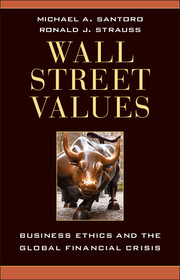Preface
Published online by Cambridge University Press: 05 February 2013
Summary
More than four years after the financial crisis that erupted in September 2008, there has been no dearth of books analyzing its origins. Numerous government hearings, documentary films, journalistic investigations, and a national independent commission report have all added to our understanding of the crisis. Certainly a reader might reasonably question the purpose of a new book on the subject. Our simple answer is that the financial crisis was fundamentally a crisis of business ethics rooted in almost three decades of moral, financial, and institutional transformation on Wall Street. Indeed, the most important finding of Wall Street Values is that business ethics and values matter, and that no amount of structural reform and government regulation will ensure the stability of the global financial system unless the ethical practices and values of Wall Street professionals are aligned with market efficiency and the public welfare. In this book we detail when and how Wall Street’s business model and values diverged from the public interest, and we offer a roadmap for realignment.
At the same time that we seek to avoid the Charybdis of redundancy, we are mindful too of the Scylla of obsolescence. As Wall Street Values goes to press, each week brings fresh news of Wall Street’s ineptitude and malfeasance – the botched Facebook offering by a once top-tier investment bank, a “London Whale” losing billions of dollars in unsupervised trading bets for a global bank renowned for its risk management prowess, and a financial firm entrusted with executing market transactions for customers big and small losing nearly half a billion dollars in one morning because of a software glitch that kept automatically trading without any human control. A reader might reasonably question the point of a book written before these developments fully unfold. Again our answer returns to the primacy of ethics, particularly in a time of change and turmoil. Two and a half millennia ago, Confucius, writing at a time of great transformation and uncertainty in ancient China, compared virtue to the North Star, remaining in its place while all the other stars moved about it. So too we believe that focusing on the ethical roots of the financial crisis elucidates how our financial institutions can operate in a manner that nurtures both profits and social prosperity.
- Type
- Chapter
- Information
- Wall Street ValuesBusiness Ethics and the Global Financial Crisis, pp. vii - xiiPublisher: Cambridge University PressPrint publication year: 2012

